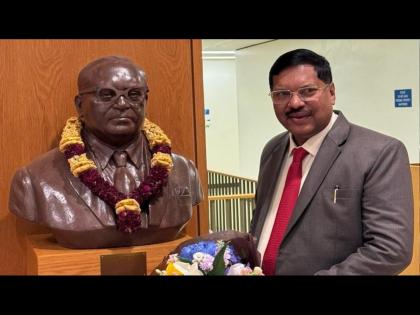Justice BR Gavai Appointed as 52nd Chief Justice of India, Oath on May 14
By Lokmat English Desk | Updated: April 29, 2025 21:15 IST2025-04-29T21:07:40+5:302025-04-29T21:15:13+5:30
Justice Bhushan Ramkrishna Gavai has been appointed as the 52nd Chief Justice of India. He will take oath of ...

Justice BR Gavai Appointed as 52nd Chief Justice of India, Oath on May 14
Justice Bhushan Ramkrishna Gavai has been appointed as the 52nd Chief Justice of India. He will take oath of office on May 14 and will succeed incumbent Chief Justice Sanjiv Khanna. President Droupadi Murmu will administer the oath to Justice Gavai. Born on November 24, 1960, in Amravati, Justice Gavai enrolled with the Bar on March 16, 1985. He was appointed as a permanent judge of the Bombay High Court on November 12, 2005.
President Droupadi Murmu has appointed Supreme Court Justice Bhushan Ramkrishna Gavai as the next Chief Justice of India. He will assume charge on May 14, following the retirement of the current Chief Justice, Sanjiv Khanna, on May 13 pic.twitter.com/dw8vfnN4qv
— IANS (@ians_india) April 29, 2025
During his tenure, Justice Gavai has been part of several Constitution Benches of the Supreme Court. These benches have delivered key judgments that shaped Indian constitutional law.
Justice Gavai was part of the five-judge bench that unanimously upheld the Central government’s 2019 decision to abrogate Article 370. The provision had earlier granted special status to the former state of Jammu and Kashmir.
Read Also | Maharashtra Govt Successfully Secures Sword of Raghuji Bhonsle From London Auction
He was also involved in a landmark ruling where a five-judge bench struck down the Centre’s electoral bonds scheme. The scheme had allowed anonymous political funding.
Justice Gavai served on another significant bench that upheld the Centre’s 2016 decision to demonetise Rs 1,000 and Rs 500 notes. The judgment was passed by a 4 to 1 majority.
In a major verdict earlier this year, Justice Gavai was part of a seven-judge Constitution Bench. The bench ruled by a 6 to 1 majority that states have constitutional authority to create sub-classifications within Scheduled Castes. This ruling allowed targeted reservations for the most backward groups among them.
Justice Gavai is set to become the second Dalit to hold the top post in the Indian judiciary.
Open in app